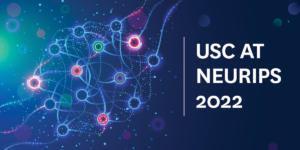
ISI researchers Greg Ver Steeg (left) and Xiang Ren received Amazon Research Awards, 2018.
Two researchers from the USC’s Information Science Institute (ISI) — Greg Ver Steeg and Xiang Ren — have received 2018 Amazon Research Awards for their work in invariant representation learning and neural-symbolic deep learning for natural language processing, respectively.
The annual awards offer up to $80,000 in funding and $20,000 in Amazon Web Services promotional credit per project to support researchers worldwide in a variety of research areas such as computer vision, natural language processing, robotics and security.
This year, a total of 82 researchers around the world received the awards.
“On behalf of everyone at ISI, I want to sincerely congratulate Greg and Xiang for receiving the prestigious Amazon Research Awards,” said <ahref=”https: www.isi.edu=”” people=”” galstyan=”” about”=””>ISI AI division director Aram Galstyan, a research associate professor in computer science at USC. </ahref=”https:>
“They are both rising stars in the field of AI and these well- deserved grants reflect the caliber of researchers we have at the institute.”
Ver Steeg, who holds a joint appointment as research assistant professor in computer science at USC, will use the fund for a project titled “Information-theoretic Invariant Representation Learning.”
This project aims to improve the performance of deep- learning methods, offering an optimized and more flexible approach when dealing with sparsely labeled, complex data.
Ren, who also holds a joint appointment as assistant professor in computer science at USC, received the award for his project “Model Programming: Model-Level Fusion of Structured Knowledge Priors for Information Extraction.”
By introducing model programming, Ren’s team hopes to tackle “text heavy” unstructured data, which accounts for most of the existing data generated by society, and extract it into machine-actionable structures. This could help in building smarter question-answering systems and automating literature-based biomedical research discovery.
Published on February 4th, 2019
Last updated on May 20th, 2021












